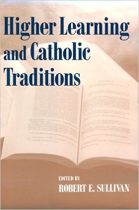Sullivan, R. E. (2001). Higher learning & Catholic traditions. Notre Dame, Ind: University of Notre Dame Press.
 This edited volume derives from papers delivered at a 1999 conference sponsored by the Erasmus Foundation, which aims to “build bridges between the apparently disconnected worlds of Catholic thought and secular scholarship” (xi). There is continuity between this and Gleason’s “Contending with Modernity” (1995) as it discusses the period following the failure of Neo-Scholasticism and the lack of integration between “the intellectual traditions of Catholicism” and increasingly specialized departments and majors. The first chapter is particularly interesting.
This edited volume derives from papers delivered at a 1999 conference sponsored by the Erasmus Foundation, which aims to “build bridges between the apparently disconnected worlds of Catholic thought and secular scholarship” (xi). There is continuity between this and Gleason’s “Contending with Modernity” (1995) as it discusses the period following the failure of Neo-Scholasticism and the lack of integration between “the intellectual traditions of Catholicism” and increasingly specialized departments and majors. The first chapter is particularly interesting.
Chapter 1: Alasdair MacIntyre: Catholic Universities: dangers, hopes, choices.
MacIntyre focuses on the problem of integrating the specialized disciplines with the broader aim of developing the intellect to allow “a full range of powers of understanding and judgment” (p.2). He describes the problems of studying disciplines in isolation, providing “only a distorted and one-sided development of the mind” (p.3). He speaks of the need to “be perplexed” and ask interesting questions (still a common theme today), and the quest to making the order of the universe as the common goal of secular and Catholic education. However, this is threatened by the common American belief that there is no such thing as a “unified order of things” that can be understood.
Here is a wonderful question on which to reflect: “would a wonderfully effective undergraduate teacher, not only in terms of his or her own discipline, but also in terms of communicating something of how that discipline contributes to and finds its place within an integrated order of things” … who has published only one scholarly article .. “receive tenure and promotion, and honors in that university?” (He compares this with a specialist willing to teach only graduate students and publishes cutting edge research is in his or her discipline). (p.6).
McIntyre notes that philosophy and theology have become specialized disciplines unrelated to others and one another and argues that (especially at the graduate level) all programs need “a philosophical and theological dimension” (p.9). He posits two rival conceptions (directions) for Catholic universities. Both include religious practices, but one integrates theological and philosophical dimensions into teaching and research while the other essentially adds religious practices and Catholic academic concerns to a standard secular program. He argues that the former requires “a preponderance of Catholic faculty” but also non-Catholic faculty and scholars (to address the secular responsibility). He makes the interesting observation that some of these non-Catholics “may and often do respect the calling with more integrity than some Catholics to” (p.11).
McIntyre argues that a university education is not (except “incidentally”) job preparation (as many American students think) and that undergraduate education should include only “the liberal arts and natural sciences” (p.13; although he later mentions economics) taught in a complementary manner. In an echo of Lonergan, he sees the product of successful education as enabling “students to view themselves and the world in a new and unexpected light. They will have a different and enlarged understanding of the multiplicity of human goods and the human good” (p.14).
He observes that many universities make a “corresponding mistake” (in seeing education as job preparation) by treating students as consumers and “give them what they want”. (He also notes the problem that the high cost of education had led to a “return on investment” mentality). But: “it is the primary responsibility of a university … to give students what they need, not want they want, and to do so in such a way that what they want becomes what they need” (p.15).
McIntyre argues that the trend of “advanced modernity” and its market forces lead to a “compartmentalized” society (not just intellectually but separation of work, family and religion) and that Catholic universities will inevitably follow this trend unless they actively resist it through truly integrative education and faculty who understand one another’s disciplines in relation to their own and the larger whole. He recognizes that this is a major endeavor, but stresses the importance of “smaller decisions on particular matters” and the need for administrators to be actively involved in “reading, teaching and thinking as faculty members do” in order to act constructively in shaping a truly Catholic university (p.20).
Questions
- How might we respond to McIntrye’s question about promotion and tenure, and how should we work to change this “reward system”, especially in the context of smaller institutions such as SHU wanting to be “a research university”?
- Related: is the separation of teaching, service and scholarship another example of compartmentalization, and if so, how might we overcome it? (Boyer is useful in thinking about this).
- Is it possible to convince students (and parents and employers) that a university education is not simply “job preparation”, especially given the current economy and high tuition/student debt?